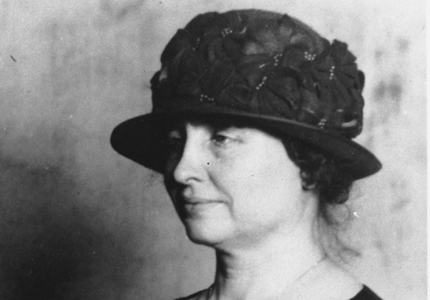Helen Keller lost her vision and hearing before age 2. But with help from her tutor, Anne Sullivan, Keller learned how to speak, read and write. She graduated magna cum laude from Radcliffe College and fought tirelessly for the blind throughout her lifetime. She was also a passionate socialist and suffragette.
Helen Keller’s Early Days
Helen Keller was born on June 27, 1880, in Tuscumbia, Alabama, in the family home, called Ivy Green. Keller’s parents were highly educated people who refused to abandon their daughter’s education when she lost her hearing and sight as a result of a fever at 19 months of age. They hired Anne Sullivan to tutor Keller. (Sullivan had once been blind but was restored to partial sight through a series of operations.)
Anne’s first task was helping Helen, who had become quite an unruly child without ever learning how to speak, to gain self-control. Once that occurred, Sullivan had an opportunity to start spelling words into Helen’s hand to help the girl connect letters and words with objects’ names.
At first, Helen thought her teacher was just playing a game. Helen memorized words but failed to understand that they did, in fact, have meaning.
It wasn’t until April 5, 1887, when Anne took Helen to an old pump house that Helen finally understood that everything has a name. Anne put Helen’s hand under the stream and began spelling “w-a-t-e-r” into her palm, first slowly, then more quickly.
Suddenly, Helen understood. She realized that the letters were referring to the water running over her hand. By the end of the day, Helen had learned 30 more words.
From that breakthrough moment, Helen’s world continued to expand. She learned to read, write and even speak. Helen could also walk dogs, ride a horse and swim.
Eventually, both the teacher and the student went to Radcliffe College.
A series of images depicting Ivy Green and other important locations and people in Keller’s life is available through an online photo gallery from the Helen Keller Kids Museum.
Sources in this Story
- American Foundation for the Blind: Hellen Keller Biography
- findingDulcinea: On This Day: Helen Keller Comprehends the Word “Water”
- Helen Keller Kids Museum (American Foundation for the Blind)
- Helen Keller International: Helen Keller
- Rethinking Schools: The Truth about Helen Keller
Notable Accomplishments
Keller’s autobiography, “The Story of My Life,” was written when she was a college student. The Tony-and-Oscar-winning play and film, “The Miracle Worker,” first produced in 1959 and 1962, dramatized her early life and inspires viewers to this day.
Helen Keller is remembered as one of the most influential and vocal advocates on behalf of the blind. She spent her life petitioning state and national legislators, lecturing at international forums, traveling abroad to countries with high incidence of blindness and writing about the challenges blind people encounter. Keller allowed the organization Helen Keller International to use her name in pursuit of its efforts to stop preventable blindness.
The Woman and Her Work
- “The Story of My Life” by Helen Keller
- “Helen Keller: A photographic story of a life,” by Leslie Garrett
- “The Miracle Worker” (DVD)
The Rest of the Story
According to Pam Whitty’s essay, “Helen Keller: Words, Worlds and Literacies,” “For [Helen], sight and sound were linked to the awakening of the soul, and the awakening of her soul was inextricably linked to a reawakening of language within her.” Keller explained her appreciation for her tutor: “I got used to the silence and darkness that surrounded me until she came my teacher—who was to set my spirit free.” But Keller admits that she was not always easy to work with, explaining, “One morning Phantom [Keller’s name for her preliterate self] would not sit down to learn her words which meant nothing to her, and kicked over the table…Phantom’s fist flew out like lightning and knocked out two of Annie’s teeth.”
Most discussions of Keller do not completely represent her social conscience, argues Ruth Hubbard in an essay on Keller. Hubbard points to Keller’s suffragette and socialist leanings, two crucial, if often overlooked, elements of her ideology. According to Hubbard, “While she was alive, Helen Keller fought against the media’s tendency to put her on a pedestal as a ‘model’ sweet, good-natured, handicapped person who overcame adversity.” Helen Keller died on June 1, 1968, at her home in Easton, Connecticut.
This article was originally written by Isabel Cowles; it was updated May 24, 2017.











